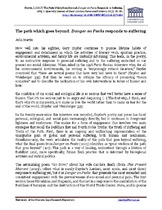| dc.contributor.author | Martin, Julia | |
| dc.date.accessioned | 2018-10-11T12:16:26Z | |
| dc.date.available | 2018-10-11T12:16:26Z | |
| dc.date.issued | 2017 | |
| dc.identifier.citation | Martin, J. (2017) The Path Which Goes Beyond: Danger on Peaks Responds to Suffering. ANQ: A Quarterly Journal of Short Articles, Notes and Reviews, 30(2): 81-87. | en_US |
| dc.identifier.issn | 0895-769X | |
| dc.identifier.uri | http://dx.doi.org/10.1080/0895769X.2016.1274634 | |
| dc.identifier.uri | http://hdl.handle.net/10566/4109 | |
| dc.description.abstract | Now well into his eighties, Gary Snyder continues to pursue lifetime habits of engagement and detachment in which the activities of literary work, spiritual practice, environmental activism, and family life are mutually informing. This leads, in the poetry, to an instructive response to personal suffering and to the suffering embodied in our present eco-social dilemmas. When asked in the 1996 Paris Review interview why, for all his environmental involvements, his writing is “surprisingly without disasters,” Snyder countered that “there are several poems that have very bad news in them” (Snyder and Weinberger 335). | en_US |
| dc.language.iso | en | en_US |
| dc.publisher | Taylor & Francis | en_US |
| dc.rights | This is the author-version of the article published online at: http://dx.doi.org/10.1080/0895769X.2016.1274634 | |
| dc.subject | Gary Snyder | en_US |
| dc.subject | Danger on Peaks | en_US |
| dc.subject | Poetry | en_US |
| dc.title | The path which goes beyond: Danger on Peaks responds to suffering | en_US |
| dc.type | Article | en_US |
| dc.privacy.showsubmitter | FALSE | |
| dc.status.ispeerreviewed | TRUE | |
| dc.description.accreditation | ISI | |

